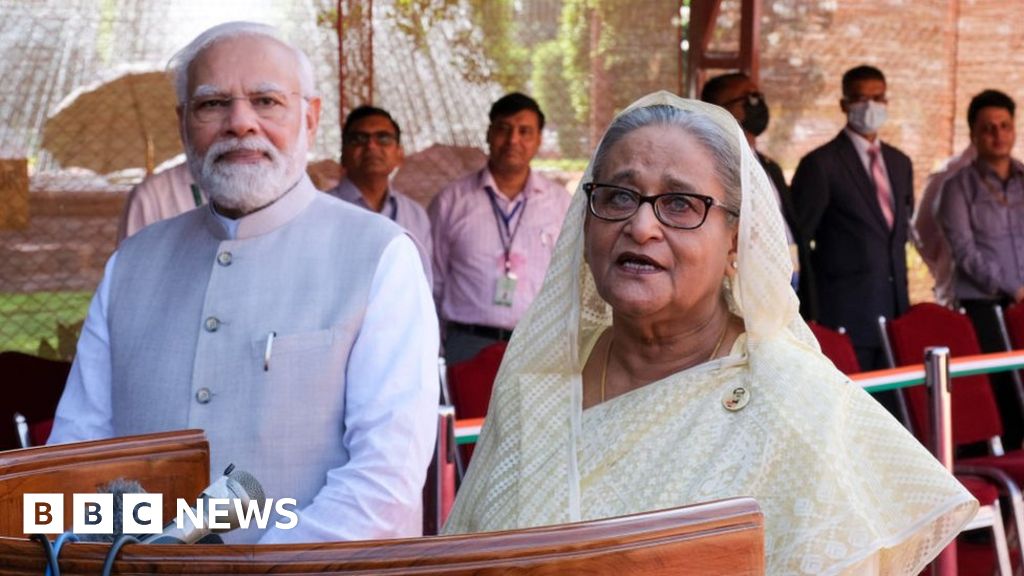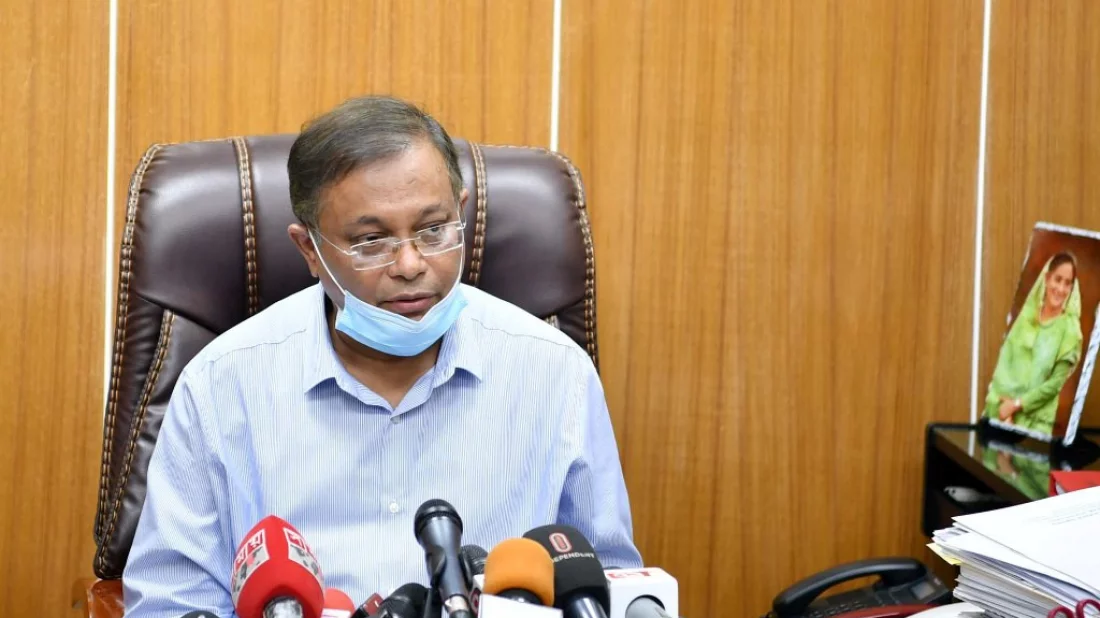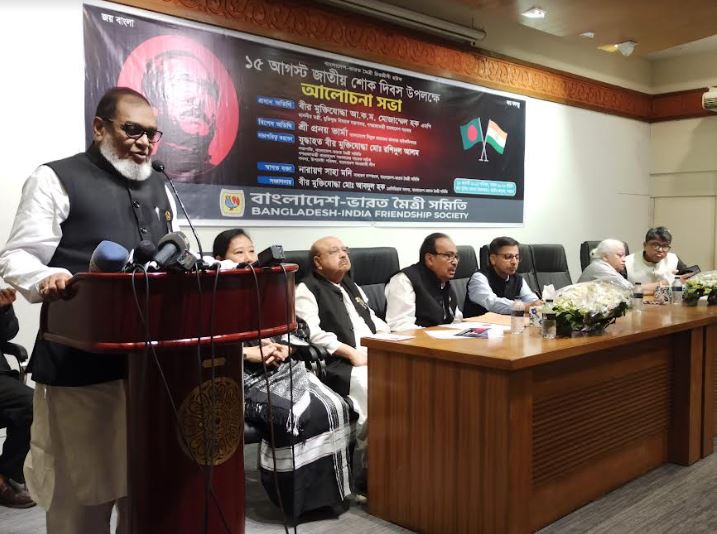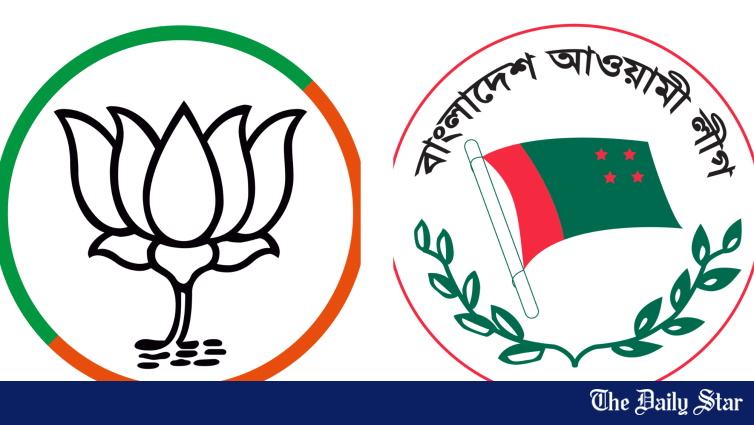Bangladesh elections: Why India matters across the border
3 January 2024
By Anbarasan Ethirajan,
BBC News
Sheikh Hasina alongside Narendra Modi in Delhi last year
As Bangladesh gets ready to hold general elections on 7 January, the role of its giant neighbour India is being intensely discussed in the country.
Prime Minister Sheikh Hasina is seeking a fourth consecutive term and her win looks inevitable as the main opposition parties are boycotting the election.
The Bangladesh Nationalist Party (BNP) and its allies say they have no faith that Ms Hasina will hold a free and fair election. They asked her to step down and allow the polls to be held under a neutral interim government - demands she rejected.
The Muslim-majority nation of about 170 million people, Bangladesh is almost surrounded on three sides - barring a 271km (168-mile)-long border with Myanmar in the southeast - by India.
For India, Bangladesh is not just a neighbouring country. It's a strategic partner and a close ally, crucial to the security of its north-eastern states.
So, Indian policy makers argue that Delhi needs a friendly regime in Dhaka. Ms Hasina has forged close ties with India since she was first elected in 1996 and it's no secret that Delhi wants to see her return to power.
Ms Hasina has always justified Dhaka's close relationship with Delhi. During a visit to India in 2022, she said Bangladesh should not forget India, its government, people and armed forces as they stood beside the country during the independence war in 1971.
This backing for her Awami League party has triggered sharp criticism from the opposition BNP.
"India should support the people of Bangladesh and not a particular party. Unfortunately, Indian policy makers don't want democracy in Bangladesh," Ruhul Kabir Rizvi, a senior BNP leader told the BBC.
Mr Rizvi said Delhi was "alienating the people of Bangladesh" by openly rooting for Ms Hasina and backing what he called a "dummy election".
An Indian foreign ministry spokesperson refused to comment on the BNP's allegations on Delhi's alleged interference in Bangladesh polls.
"Elections are a domestic matter to Bangladesh. It's for the people of Bangladesh to decide their own future. As a close friend and partner of Bangladesh we would like to see peaceful elections there," the spokesperson said in response to a question by the BBC.
Getty Images Supporters and opponents of Bangladesh Prime Minister Sheikh Hasina rally in front of the World Bank on 1 May 2023 in Washington DC.Getty Images
Delhi fears the return of Islamist groups if Sheikh Hasina is voted out.
India is also concerned that the return of BNP and the Jamaat-e-Islami party could pave the way for the return of Islamists in Bangladesh, as it had happened when the coalition was in power between 2001 and 2006.
"They gave rise to so many of these jihadi groups which were used for various purposes, including the 2004 assassination attempt on Ms Hasina and the capture of 10 trucks full of arms that came from Pakistan," Pinak Ranjan Chakravarty, a former Indian High Commissioner in Dhaka told the BBC.
Soon after coming to power in 2009, Ms Hasina also won favour with Delhi after acting against ethnic insurgent groups of India's northeast, some of which were operating from Bangladesh.
India and Bangladesh share close cultural, ethnic and linguistic ties. Delhi played a key role in Bangladesh's independence from Pakistan in 1971 by sending in troops in support of the Bengali Resistance Force.
Dhaka depends on Delhi for the supply of many essential commodities like rice, pulses and vegetables. So, India is influential in Bangladesh from the kitchen to the ballot.
India has also offered more than $7bn Line of Credit to Bangladesh since 2010 for infrastructure and development projects.
Why Bangladesh's election has become a one-woman show Political violence grips Bangladesh as election looms.
But over the decades, there have been irritants in relations ranging from disputes over sharing of water resources to accusations of meddling in each other's internal affairs.
"India has an image problem in Bangladesh. It comes from the perception that Bangladesh is not getting the best of the good neighbour, whether it comes to Delhi's support for the government that possibly doesn't enjoy full democratic legitimacy or in deals where we seek equitable share," Debapriya Bhattacharya, distinguished fellow at the Centre for Policy Dialogue in Dhaka, told the BBC.
Ms Hasina came to power for a second time in January 2009 and her party has since won two more elections, although there have been accusations of widespread vote-rigging. The Awami League has denied the allegations.
Though India has gained road, river and train access via Bangladesh to transport goods to its north-eastern states, critics say Dhaka is still not able to do full-fledged overland trade with landlocked Nepal and Bhutan across the Indian territory.
India also has other strategic reasons to have a friendly government in Dhaka.
Delhi wants road and river transport access for its seven north-eastern states through Bangladesh.
Now the road and train connectivity from the Indian mainland to its northeast is through the "chicken's neck" - a 20km (12 mile) land corridor that runs between Nepal, Bangladesh and Bhutan. Officials in Delhi are afraid this stretch is strategically vulnerable in any potential conflict with India's rival, China.
While several Western governments had wanted to impose additional sanctions on Bangladeshi officials over alleged human rights violations and extra-judicial killings, India has been resisting the move calling it counterproductive. More so, since Beijing is keen to extend its footprint in Bangladesh as it battles for regional supremacy with India.
Pool Bangladesh's Prime Minister Sheikh Hasina shakes hands with Chinese President Xi Jinping as she arrives for a meeting at the Diaoyutai State Guesthouse on 5 July 2019 in Beijing, ChinaPool
Officials in Delhi fear that Bangladesh could warm up to China if there's a potential conflict with Delhi
"We have conveyed to the West that if you push Ms Hasina, she will go into the Chinese camp, like other countries have done. That will cause a strategic problem with India," the former Indian diplomat, Mr Chakravarty, said. "We can't afford that," he added.
Despite close ties between the two governments there is suspicion among some Bangladeshis when it comes to India.
"I don't think Indians are friendly in all the areas. We are always having a problem with India as we are a Muslim nation," Zamiruddin, a vegetable merchant in Dhaka, said.
"We will have to safeguard ourselves first and then rely on others. Otherwise, we will be in trouble," he added.
While Delhi is concerned about the possibility of an Islamist regrouping, many in Bangladesh are worried about what's happening across the border.
Rights groups say since the Hindu-nationalist Bharatiya Janata Party (BJP) came to power in 2014 in India, discrimination against religious minorities, particularly Muslims, has increased - an allegation the BJP denies.
Indian politicians also talk about alleged infiltration by "Bangladeshi illegal immigrants' - seen as a part reference to Bengali Muslims who live in states like Assam and West Bengal.
"The maltreatment of Indian Muslims creates high potential possibility of maltreatment of the Hindu minorities in Bangladesh," Mr Bhattacharya said.
Hindus constitute nearly 8% of Bangladesh's population.
Delhi is clear that Sheikh Hasina at the helm will suit its interests. But the challenging part will be reaching out to the people of Bangladesh.













































